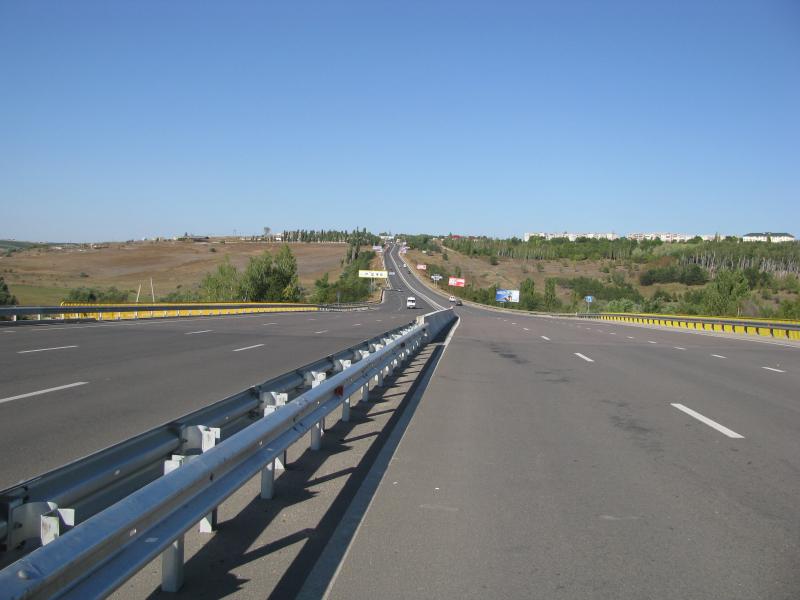Russian blockades make Moldova’s dilapidated roads key to moving grain out of Ukraine and aid in. Here’s how the country is upgrading its transport links
Radu Rogovei, head of the Roads and Transport Department at Moldova’s Ministry of Infrastructure, is the third generation of his family to build roads. “My earliest memory is walking with my father, looking at the roads he built,” says Rogovei. “My great-grandfather was responsible for maintenance of 15 kilometres of road from Cernăuți in Ukraineto Suceava in Romania. Roads are in my heart.”
The roads that Rogovei builds are now also at the heart of a major ongoing effort to connect Ukraine to its neighbour, Moldova, and on to the European Union, because the Russian invasion has cut or slowed other transport links. At stake is the massive export of Ukraine’s cereals and agricultural goods necessary to prevent global food insecurity and vital humanitarian aid, animal feed and fertilisers needed in Ukraine.
“We have compassion for our Ukrainian sisters and brothers,” says Lilia Dabija, Moldova’s Minister of Infrastructure and Regional Development, who has worked closely with Rogovei for 3 years. “We are trying to be as efficient as possible in meeting new and different transport needs for moving goods due to the war and also relocating refugees leaving Ukraine.”
Moldova is the poorest country in Europe, according to the World Bank, and lacks resources to develop its transport networks alone. In June 2022, Moldova intensified its relationship with Europe when, like Ukraine, it gained the status of a European Union candidate country.
Building and renewing roads to ensure the movement of goods across Moldova to and from Ukraine is quicker and less expensive than renewing rail network, which involves larger, costly infrastructure. The tracks of the Ukrainian and Moldovan rail network are a different gauge from the tracks in other parts of Europe. Around 10% of Ukrainian goods that arrive in Moldova by rail through must be unloaded onto trucks to be transported to other countries. So, Moldova’s roads have to be part of an accessible transport network that can manage a far greater volume of goods now than in the past.
Paving the way for Solidarity Lanes
Ukraine is known as the breadbasket of Europe. Before the Russian invasion, the country supplied:
- 8% of wheat and 13% of corn exports globally;
- 50 million tonnes of cereals;
- 50% of the World Food Programme’s wheat supply;
- a third of the world’s sunflower oil.
Most of these exports went by sea. Ukrainian Black Sea ports accounted for 90% of its grain and oilseed exports. The war has considerably reduced the export of agricultural goods. This has global consequences for hunger and food security, leading to a worldwide increase in the prices of food and a scarcity of some essentials.
With ports blockaded, the European Union has established ‘Solidarity Lanes’ to ensure that goods can be exported from and imported into Ukraine. The Solidarity Lanes initiative aims to develop alternative routes.
The European Investment Bank is responding to the European Commission’s Solidarity Lanes call for support. With financing from the European Investment Bank, existing transport infrastructure projects in Moldova have been expanded. New projects are underway to build roads that improve links with Romania, the European Union neighbour on Moldova’s western border, and Ukraine to its north and east.
In 2022, the European Investment Bank loaned Moldova €100 million for the rehabilitation and upgrade of key national roads. This is an increase to an existing €150 million loan from the EU bank signed in 2013. In March 2022, the European Investment Bank also provided to Moldova €150 million for reconstruction of road segments on the trans-European Transport Network. These funds will go towards the upgrade of the Solidarity Lanes network running through Moldova.
“I would say in the near future the main road network of the country will be in a decent shape,” says Vigo Legzdins, lead strategic roads engineer at the European Investment Bank.

Moldova tackles road links to Ukraine
Roads financed with the increased European Investment Bank financing include one leading to Moldova’s only international port, Giurgiulești on the Danube River.
“The roads in Moldova are quite dilapidated, so there are a lot of problems that need urgent tackling,” says Stella Renita, a senior loan officer at the European Investment Bank. “Now, in the context of the war in Ukraine, there is even a greater need for good roads and, so there is a great need for investment.”
Moldova road upgrade ties country to EU
European Investment Bank financing to improve Moldova’s road networks is part of the European Union’s strategy to support global transport infrastructure. The European Union set up the Global Gateway strategy in 2021 to develop smart, clean and secure links in the digital, energy and transport fields and to strengthen health, education and research systems worldwide. The Global Gateway aims to mobilise up to €300 billion of investment in key infrastructure around the world between 2021 and 2027.
The European Investment Bank and Moldova is discussing financing needs to renovate rail tracks and expand the rail network with new sections as a Solidarity Lanes action to boost Ukraine’s transport connections for trade.
In 2022, the European Investment Bank invested almost €280 million in key sectors of Moldova’s economy. This will support Moldova in accelerating its accession to membership of the European Union.
“We Moldovans are very enthusiastic to support Ukraine and the European Union,” says Infrastructure Minister Dabija. “As a candidate country, we have achieved a five-fold increase in the volume of goods transported in the port area linking Romania and Moldova to Ukraine.”
“Hard times motivate people to do more and be stronger,” says Dabija. “Moldova is a small country with a very big heart.”
